How to Learn Data Science on Coursera in 2022 (beginner-friendly)
A guide creating your own curriculum using Notion to learn Python programming, data science and machine learning on Coursera in 2022.
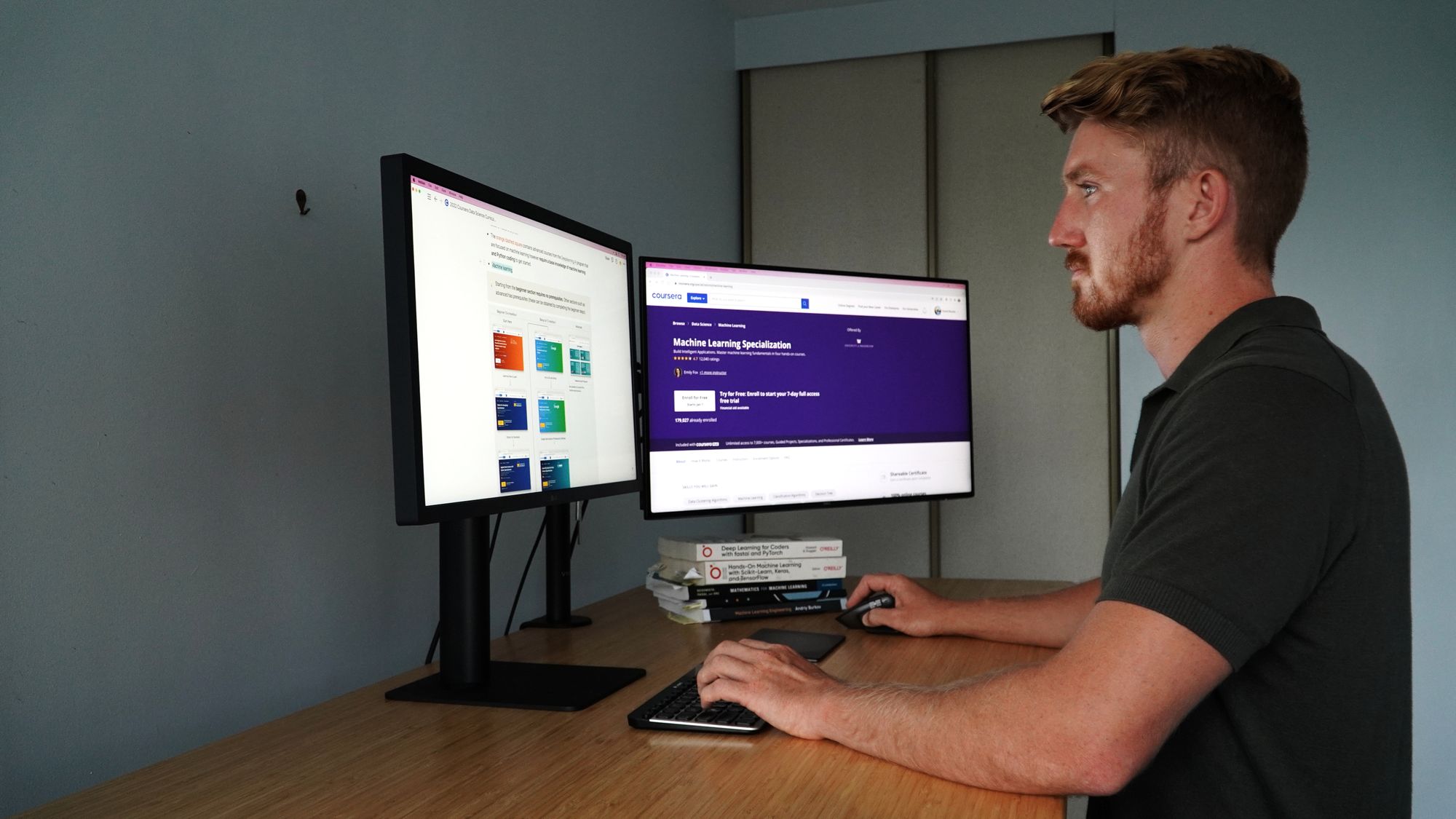
I started learning Python programming, data science and machine learning on Coursera in 2017.
My YouTube channel has videos of me going through their various courses.
And today as a machine learning engineer, I still use the skills I learned from Coursera almost every day.
Getting started
I'm often asked "what's the best path to learn data science/machine learning?"
There's no best path.
Whatever you choose, that's the best path.
What's inside this article is a path. The one I'd recommend for starting from zero experience to learning the ins and outs of Python programming, data science and machine learning.
Feel free to chop and change it to suit your own interests.
What this article covers
- A beginner-friendly outline for learning Python programming, data science and machine learning on Coursera in 2022.
- An outline for a curriculum template made in Notion (you can duplicate and change this to your own liking).
Note: I am an affiliate partner with Coursera so if you click a link in this article and pay for something, I may get a portion of the funds you pay. This does not change the price but it does allow me to create materials like this.
Resources
There's a video walkthrough to go along with this article.
It'll breakdown the text below, plus show you how I use Notion to create a curriculum tracker and various project outlines.
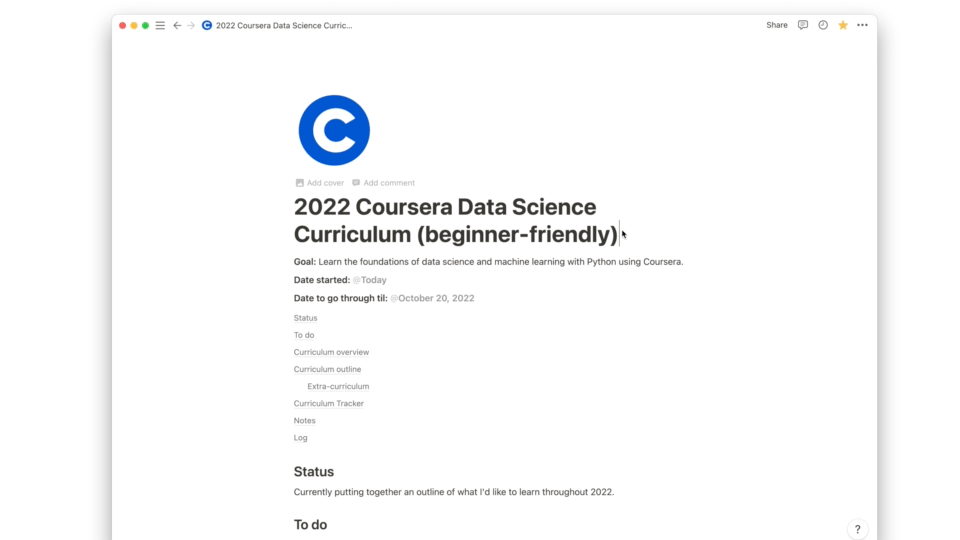
- See the video walkthrough on YouTube.
- See the curriculum template on Notion (you can copy and duplicate this).
Curriculum outline
All of the courses below are available through Coursera Plus (access to 7,000+ courses on Coursera).
You can sign up individually for the courses or to a yearly subscription of Coursera Plus to gain access for the whole year to all of them.
Curriculum focus
- Learn Python code as well as data science and machine learning fundamentals.
- Be able to look at a data problem and understand what’s needed to solve it.
- Be able to communicate and contribute data science and machine learning code to others.
Course 1: Learning How to Learn
Why this course: If you’re going to be learning online, you better learn how to learn.
What it covers: Techniques on how to approach learning a new subject, such as, focused and diffused thinking.
Course 2: Python for Everybody Specialization
Why this course: A large amount of machine learning and data science is done in the Python programming language. Before you start writing machine learning and data science code, it’s best to learn the fundamentals of Python.
What it covers: Installing Python, writing your first Python program, writing various Python data structures.
Course 3: Applied Data Science with Python
Why this course: Python is a general programming language meaning it’s capable of writing many different kinds of programs.
If you’ve learned some fundamental Python, it’s time to start writing data science specific Python with the Applied Data Science with Python Specialization.
What it covers: Pandas Python library (for manipulating data), NumPy library (for numerical computing), Matplotlib library (for visualizing data), data cleaning, Scikit-Learn library (for machine learning algorithms).
Course 4: Machine Learning Specialization by College of London
Why this course: The Applied Data Science with Python taught you how to visualize and manipulate data, now it's time to find out how to find patterns in it using machine learning algorithms.
What it covers: Machine learning concepts, classification algorithms, regression aglorithms, clustering algorithms, decision trees (a type of machine learning algorithm).
Special mention: Andrew Ng's classic Stanford machine learning course – The courses above focus on writing Python code, however if you’re interested in learning much of the theory behind the Python code you’re writing, I’d highly Andrew Ng's machine learning course. The programming exercises are done in MATLAB and Octave (other numerical programming languages) but since this curriculum focuses on Python, you may want to replicate them with Python code.
Course 5: Math for Machine Learning Specialization
Why this course: All of the machine learning code you write often triggers mathematics under the hood.
The Mathematics for Machine Learning specialization will help you understand what's happening behind the scenes of your Python code.
What it covers: Linear algebra, multivariable calculus.
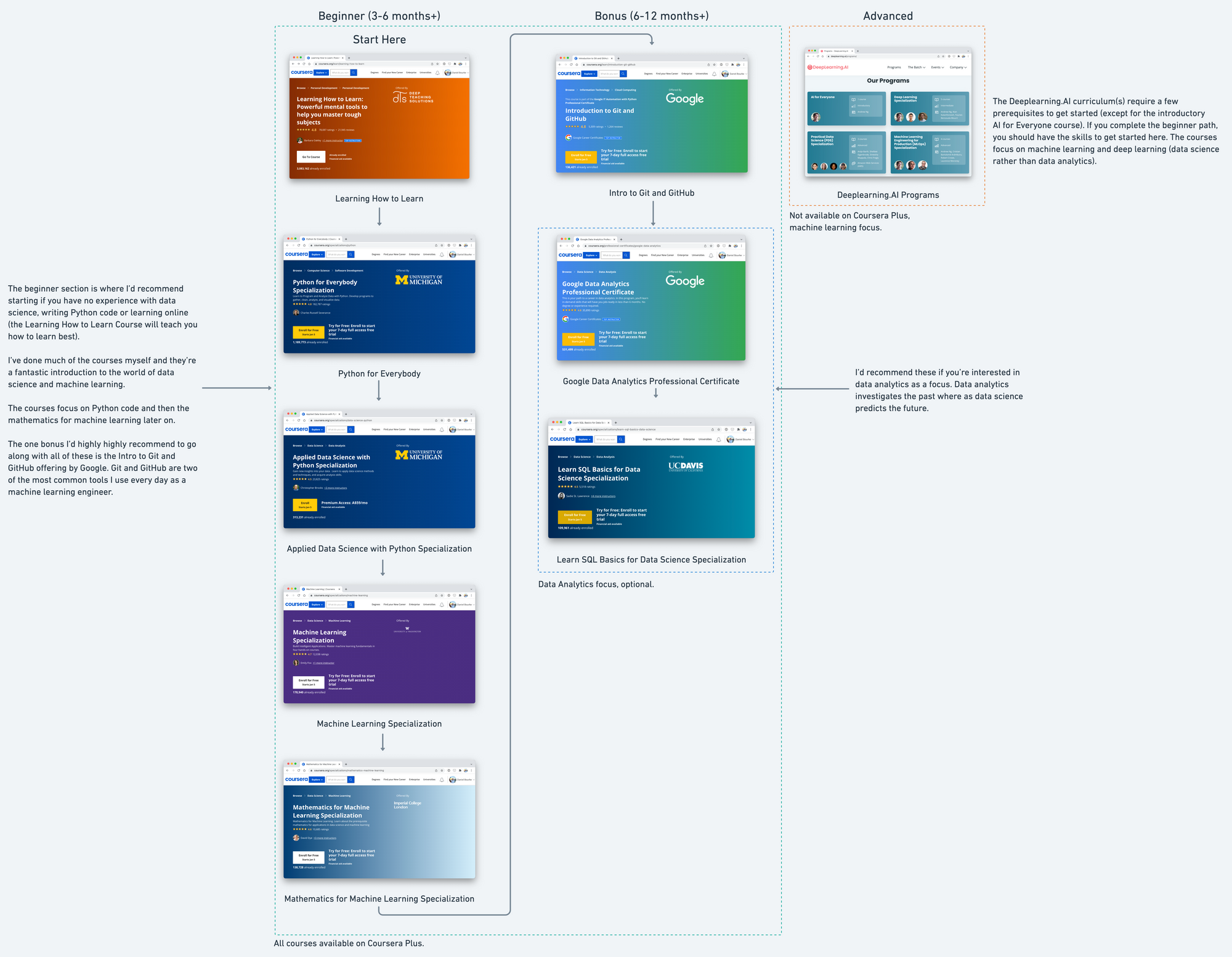
Bonuses
The following are a couple of extra resources I'd look into if you've gone through the above and are now looking for a job in the field or wanting to start working on your own projects.
Bonus 1: Google's Introduction to Git and GitHub
Why this course: Git and GitHub are two of the most important tools when it comes to writing software (I use them everyday I write code). Git keeps track of different versions of your code and GitHub helps you share it and collaborate with others.
What it covers: Using Git, using GitHub, creating pull requests on GitHub.
Bonus 2: Read "How can a beginner data scientist like me gain experience?"
Why: So you’ve completed some courses? And now you’re looking for a job? This article will give you some ideas on what to do.
What it covers: Tips and ideas on how to put the skills you’ve been learning to use and showcase them to potential employers. Hell, even skip the employer and go straight to building your own thing.
Advanced
If you've gone through the above and learned many of the fundamentals of Python programming, data science and machine learning and you're looking for more.
Here are some other Coursera specializations I'd recommend.
Data analytics focus
Both of these are available through Coursera Plus.
- Google's Data Analytics Professional Certificate – Data analytics uses data to understand the past. Since many different companies now use data to drive their business, knowing how to analyse their data can make you a prime candidate for a future role. Inside you'll learn data cleaning, data analysis, data visualization, data calculations, SQL programming.
- Learn SQL Basics for Data Science – SQL (structured query language) is the language of databases. Think of a giant Excel spreadsheet but being able to access it and manipulate it writing code. You can use Python to do so but often you may also have to use SQL. So knowing a bit of SQL can go a long way. Inside you'll learn SQL programming for filtering, sorting and summarizing data, accessing spreadsheets and creating datasets using SQL.
Machine learning focus
These courses are available on Coursera, however, they aren't included with Coursera Plus. I don't know why.
- Deep Learning Specialization — Taught by Andrew Ng (one of the OG’s of machine learning and deep learning), this specialization will teach you all about the powerful machine learning technique known as deep learning. Typically if you’re working with structured data (rows and columns, like an Excel spreadsheet), you’ll use decision tree and gradient boosted algorithms but if you’re working with unstructured data (images, natural language, sound), you’ll use deep learning algorithms.
- TensorFlow Developer Professional Certificate — TensorFlow is a Python-based deep learning framework created by Google but now it’s open-source. It’s one of the most powerful and popular deep learning libraries out there. This certificate course will get you up to speed writing deep learning algorithms with TensorFlow as well as prepare you to pass the TensorFlow Developer Certification (optional).
- Machine Learning Engineering for Production (MLOps) — Once you’ve built a bunch of machine learning models, chances are you’ll want to enable others to use them. But how do you do that? That’s where MLOps (machine learning operations) comes in. This course will teach you the steps needed to get your machine learning models into the hands of others through websites or mobile applications. It’ll also highlight many of the problems you’ll run into when doing so.
Tracking your progress
The Notion template I've linked provides a template for tracking your progress and taking notes on various courses.
As of writing (early 2022), Notion is a free product for personal use.
I use it daily for my own projects and taking notes on anything and everything.
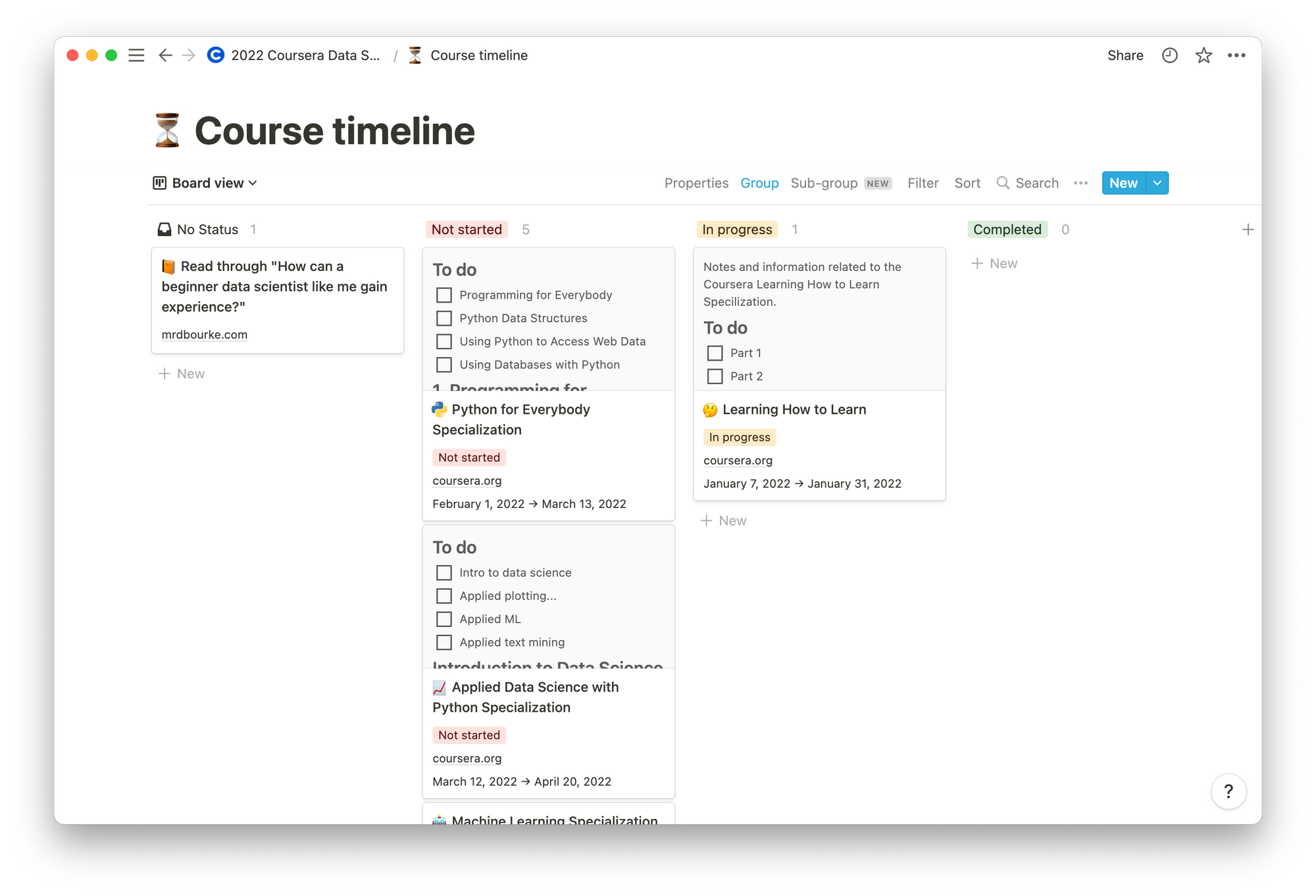
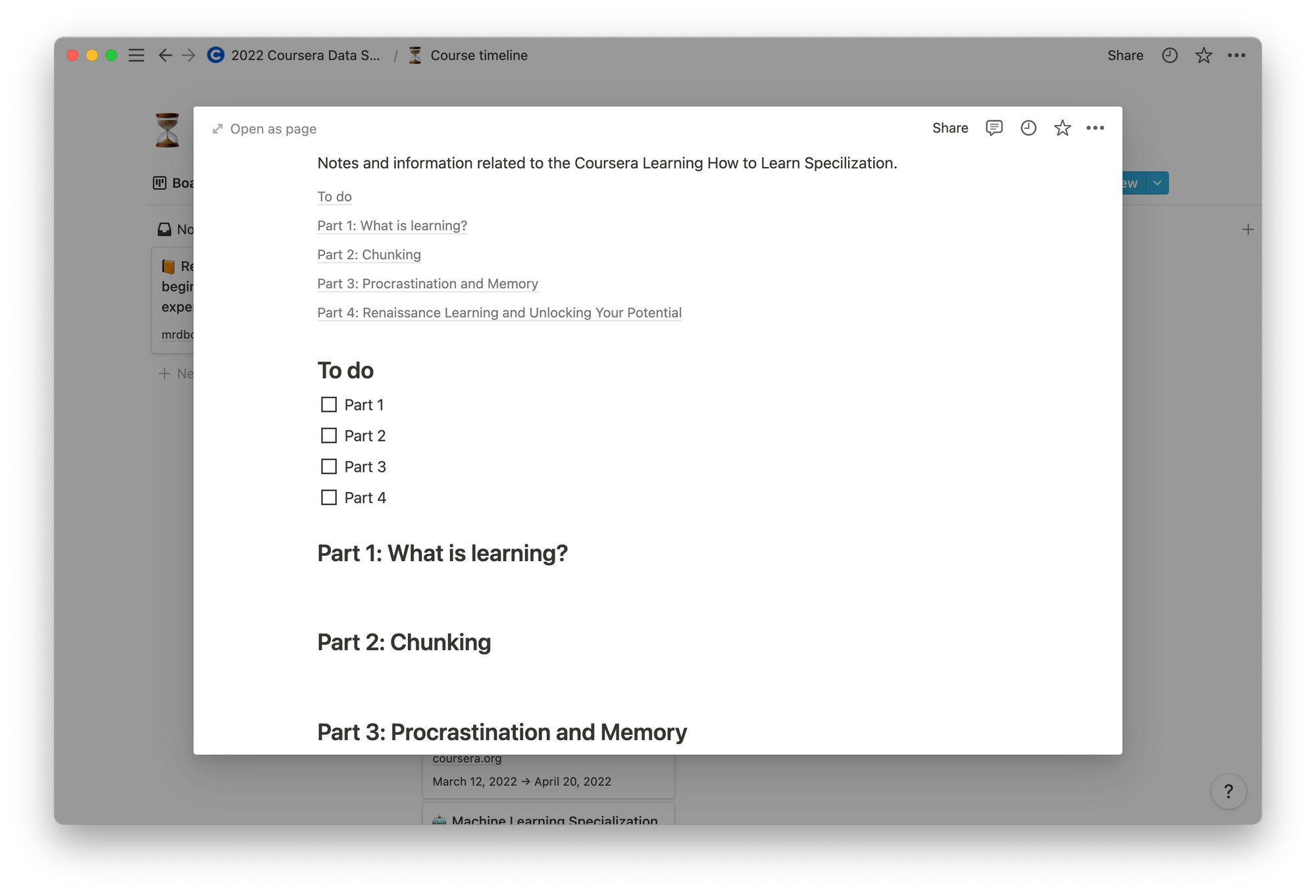
Questions
If you've got any questions about the curriculum or any of the shared resources, feel free to email me.
If a few people ask the same questions, I'll post them here.
